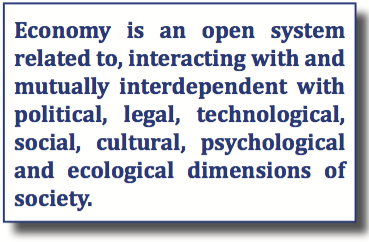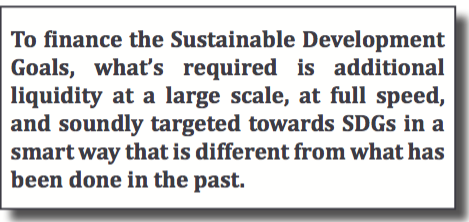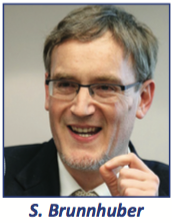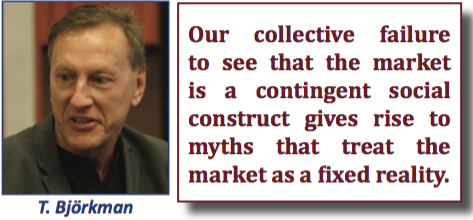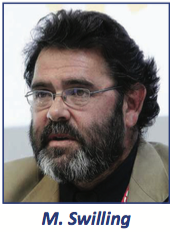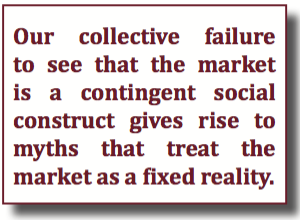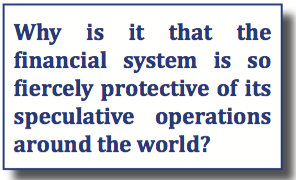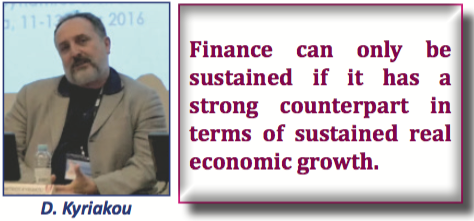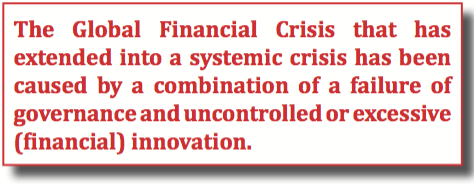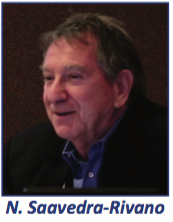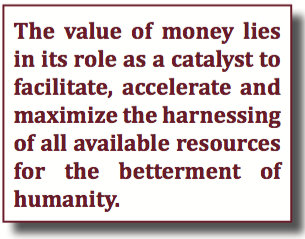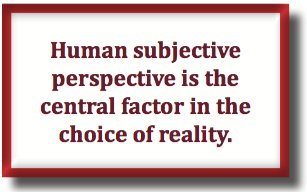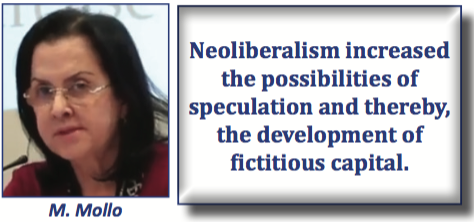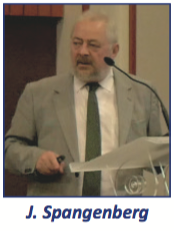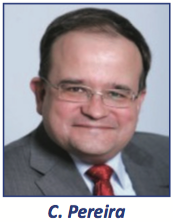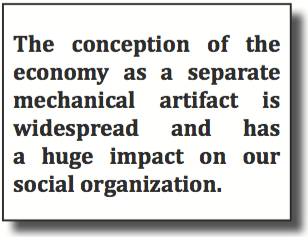| Click here to download the PDF version of the Newsletter |
 |

Our greatest achievements are products of our minds. So too, the existential problems confronting humanity today are products of the way we think. |
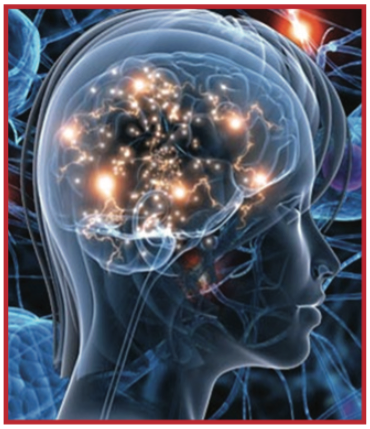 In March 2016 WAAS and World University Consortium conducted a four day lecture-discussion series at Inter-University Centre, Dubrovnik and broadcast live over the internet in collaboration with Dag Hammarskjöld University College of International Relations & Diplomacy, Zagreb; Person-Centered Approach Institute, Italy; and The Mother’s Service Society, India. The series examined the characteristics and limitations of knowledge generated by linear, compartmentalized, mechanistic thinking, quantitative and systems analysis. It explored ways to promote more organic, integrated forms of thinking that reflect the rich complexity of social reality and foster original thinking, creativity and intuitive ways of knowing. |
Ascent of Mind and Civilization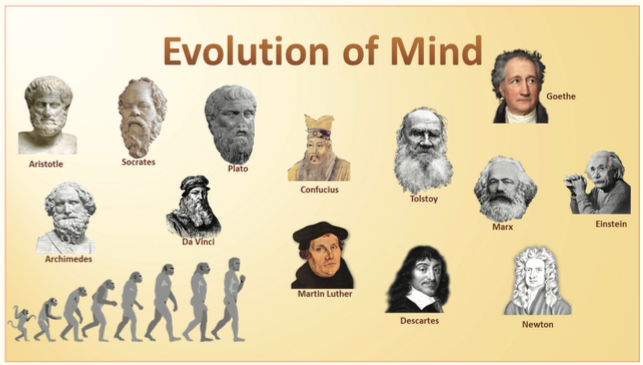 Mind and civilization have evolved in tandem since the dawn of humanity. New discoveries, inventions, ways of life and forms of knowledge arose with the evolution of humanity’s capacity for observation, imitation, symbolic thinking, intuition, logic, organization, analytic, quantitative and systems thinking. The development of these mental powers has given rise to an endless stream of new tools, art forms, symbols, oral and written languages, inventions, social organizations, ideas and beliefs, religious and spiritual experiences, economic and political systems, educational and scientific endeavors. A new paradigm in human development must be based on a different type of thinking. In spite of these monumental achievements, humanity confronts persistent and seemingly insoluble existential threats that arise from the prevailing mental monoculture of mechanistic, reductionist, materialistic, analytic thinking. These challenges call for rediscovery of long neglected mental powers and the quest for more holistic, organic and integral ways of knowing capable of comprehending the growing complexity of life in the 21st century. Paper Published in Cadmus Journal Volume 2 Issue 6. Click here for a 10 minute visual tour of the ascent of mind and civilization. |
MIND LECTURE SERIESPrisoners of Thought – Webinar with William Byers
Characteristics of Conceptual Systems – Garry Jacobs Paradigm Change and Deep Thinking – Ivo Šlaus Reality is a Social Construction – Alberto Zucconi Integrating Ideas in Science – Carlos Blanco Integrated Conception of Health – Chandra Sekaran Mind & Its Faculties – Stefan Brunnhuber Varieties of Thinking – Garry Jacobs Objectivity & Subjectivity – Chandra Sekaran Three Tools for Non-linear Thinking – Janani Harish
Creativity & Scientific Discovery – Francis Brassard Creativity & Paradigm Change – Winston Nagan Ways of Knowing – Rodolfo Fiorini Art & Science: 2 Ways of Knowing – Zdravko Radman Limits to Rationality – Mario Hytten Mind & Cultural Diversity – Marta Nešković New Paradigm Thinking – Tibor Tóth Deep Learning – Garry Jacobs |
Prisoners of Thought – Transcending the limits of our conceptual systems The truth or validity of any statement depends on the conceptual system within which it is viewed. Our conceptual systems are bounded, incomplete and usually unconscious. Insoluble problems and irreconcilable contradictions are indications we need to transcend the limitations of the constructs through which we view reality. The truth or validity of any statement depends on the conceptual system within which it is viewed. Our conceptual systems are bounded, incomplete and usually unconscious. Insoluble problems and irreconcilable contradictions are indications we need to transcend the limitations of the constructs through which we view reality.
WAAS-WUC Webinar, March 9, 2016 |
Characteristics of Conceptual Systems
Trust in the Invisible Hand
Adam Smith’s invisible hand is a classic example of a conceptual system that has been mistaken for reality and reinterpreted in countless ways to support different economic theories. A moral philosopher committed to enhance human welfare and opposed to mercantilism, Smith would be outraged by the uses and abuses to which his vaguely defined notion has been applied to justify unparalleled concentration of economic power, inequality, and persistent poverty. -Garry Jacobs |
Paradigm Change and Deep Thinking
Change is of three types—incremental, revolutionary or paradigm. What we need today is a comprehensive paradigm change that integrates different fields of knowledge and integrates science with society, human values, social welfare and well-being. |
Reversing Copernicus
The Copernican Revolution moved earth from its dominant position at the center of the universe to the status of a mere satellite. The paradigm change needed today must flip the model. It must liberate humanity from enslavement to the instruments it has created—money, technology, organization and power. The new paradigm must place human welfare and well-being at the center. ‘Reality’ is a Social Construction
The understanding of how reality is socially construed and how individuals and organizations construe their experiences is relevant for an effective promotion of change as well for the understanding of some defense mechanism like denial. |
Integrating Ideas in Science – Three PillarsWe need integrating ideas that transcend disciplinary boundaries in the physical and social sciences. The task of philosophy is to find the connection between the different fields in order to integrate all knowledge. Paper Published in Cadmus Journal Volume 2 Issue 6. |
Integrated Conception of Health
The perfect organic integration of every cell, tissue, organ and system in the human body is a close parallel to the integration of modern society and the need for integration of knowledge. Ayurveda, India’s traditional herbal system of medicine, is based on a positive, integrated conception of health—not merely as the absence of disease. Its aim is to enhance the general health of the whole body. |
Mind and Its Faculties
The human mind tries to know reality by dividing, reducing and compartmentalizing it. A unique capacity of the human mind is the capacity to envision, the power of planning, inner probing, anticipating the good and bad. |
Varieties of Thinking
Over millennia, humanity has been enriched by the development of diverse ways of knowing—mimetic and symbolic thinking in prehistoric times, intuitive thinking in ancient India, logical thinking in Hellenic Greece, analytic and quantitative thinking during the Enlightenment, systems and holistic thinking in the 20th century. Only a diversity of mental powers will enable us to comprehend and respond to the increasing complexity and interconnectedness of modern life. |
The way we think will determine the way we live
Our knowledge consists of fragmented, piecemeal, compartmentalized theories when the reality we seek to understand is inclusive, complex and integrated. Our conceptions are based on mechanistic, static, inflexible equilibrium models. Whereas, the world we live in is alive, dynamic, organic, conscious, responsive, creative and continuously evolving. We need to evolve ways of thinking that reflect the integrality, dynamism and vibrancy of evolutionary Nature. There is nothing either good or bad, but thinking makes it so. – Hamlet 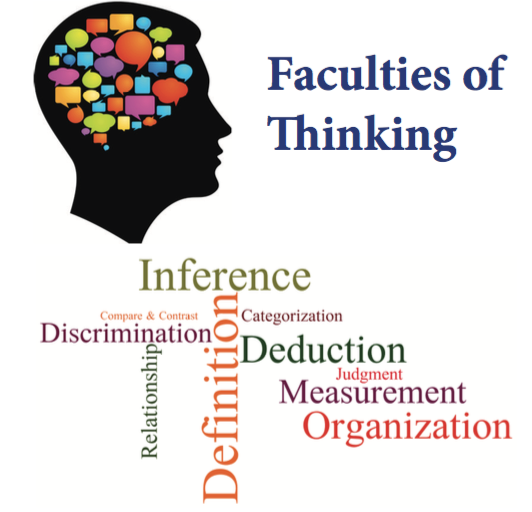 |
The Objectivity Myth |
Three Tools for Non-linear Thinking
The three words “emperor’s new clothes” convey a profound truth about prevailing social science. Paper Published in Cadmus Journal Volume 2 Issue 6. |
Creativity and Scientific Discovery
Bošković was a Croatian physicist, astronomer, mathematician, geodesist, philosopher, diplomat, poet, theologian, Jesuit priest, and a polymath. He produced a precursor of atomic theory and made many contributions to astronomy. Paper Published in Cadmus Journal Volume 2 Issue 6. The Secrets to Bošković’s Extraordinary Creativity:
|
Creativity and Paradigm Change
All human change and progress has been a result of creativity. The solutions to pressing global problems that we face require disciplined deep thinking and an ability to mobilize creative solutions. “Harold Lasswell, a creative social scientist of the 20thcentury and former President of WAAS, believed that creativity is an indispensable component of problem solving.” |
Intuitive Mathematics
During his brief lifetime, he compiled nearly 3,900 original results, equations and theorems without any formal training in mathematics. But he could provide no proof of how he derived those results. Nearly all of his results have now been proven correct. Cambridge professor G. H. Hardy described his method as “a process of mingled argument, intuition, and induction, of which he was entirely unable to give any coherent account.” Intuitive Science and the
|
Ways of Knowing
Knowledge is shared, formal and objective. Knowing is embodied, internalized as values and subjectively assimilated by the personality. We can know without thinking. |
Art and Science: Two Ways of Knowing
Science accepts facts, formulas and logic. It largely ignores intuition, imagination, emotion and the subjective aspects. What we see is determined by what we know, expect, feel and believe in. Our perceptions shape reality. Reality by itself is neutral. Science and art are but symbolic languages that help us decipher reality. The search for beauty and symmetry does not make science less objective. It makes it more human. |
Limits to Rationality
One of the fundamental findings of cognitive science is that people think in terms of metaphors. When the facts don’t fit the frame, the facts get rejected, not the frame. |
Mind, Individuality & Cultural Diversity
The individual is a catalyst for social evolution. The collective is an infinite reservoir of capacities which the individual draws on for personal development. Society generates the maximum power for accomplishment when the collective fully releases the energy and harnesses the myriad capacities of its individual members. Multiculturalism enriches the diversity of human endowments available for individual and social progress. Paper Published in Cadmus Journal Volume 2 Issue 6. |
New Paradigm Thinking – Real-World Applications
We are approaching a bifurcation point between two possible futures
The outcome will depend on our capacity to reunite the objective and subjective dimensions to envision a new paradigm by a new way of thinking. |
Deep Learning – Implications for Education
True learning is person-centered, not subject-centered. It is made possible by independent thinking, not by acquiring information. It is fostered by the willingness to embrace uncertainty, ambiguity and contradictions and reconcile them as complementary aspects of a wider truth. Development of the whole mind and whole personality of the individual is the true objective of learning. |
New Associate & Junior Fellow
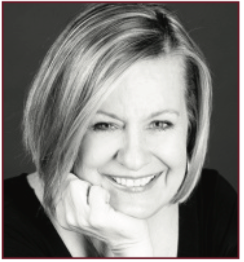
KORYN ROLSTAD(USA) Associate Fellow President & Principal Artist, Koryn Rolstad Studios; National Series Lecturer, Symposium on Healthcare Design; Board Member, Northwest Designer Craftsmen; Lecturer, MIT, Dartmouth University, Harvard University, Virginia Tech, Howard University. |
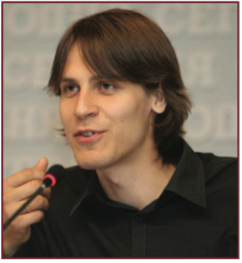
ANDRII MIROSHNYCHENKO(Norway) Junior Fellow Teaching Assistant at University of Bergen, Norway; Co-Founder, Earth Citizens for Conscious Media; Member, Kyiv Municipal Assembly; Member of Civic Chamber of Ukrainian Ministry of Environment and Natural Resource Management. |

MARTA NEŠKOVIĆ(Serbia) Junior Fellow Master’s degree in Ethnology and Social Anthropology, School for Advanced Studies in the Social Sciences, Paris, France; Research Associate, The Mother’s Service Society, India. |
CADMUS
The journal for new perspectives that integrates knowledge from all fields of inquiry to address real-life issues, and enhance our collective response to the issues facing the world today. Click here to read the current issue |
ERUDITIO
The vision of Eruditio complements and enhances the Academy’s focus on global perspectives in the generation of knowledge from all fields of legitimate inquiry. Click here to read the current issue |
  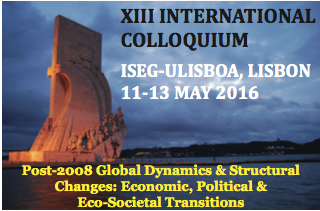 The Brexit vote, US election campaigns and Eurozone problems are signs of political, economic and social upheaval of unprecedented magnitude and complexity during the post-war period. Much of it can be traced back to economic discontent and insecurity arising from the global financial instability, trade disputes, rising unemployment, economic inequality, and persistent poverty coupled with existential threats to the environment. These issues were the focal point for discussion at the XIII International Colloquium held in Lisbon on May 11-13, 2016 to explore the eco-social and political transitions and their consequences. The Brexit vote, US election campaigns and Eurozone problems are signs of political, economic and social upheaval of unprecedented magnitude and complexity during the post-war period. Much of it can be traced back to economic discontent and insecurity arising from the global financial instability, trade disputes, rising unemployment, economic inequality, and persistent poverty coupled with existential threats to the environment. These issues were the focal point for discussion at the XIII International Colloquium held in Lisbon on May 11-13, 2016 to explore the eco-social and political transitions and their consequences.
The conference was organized by the Centre for African, Asian & Latin American Studies (CEsA), Research in Social Sciences & Management (CSG) and Lisbon School of Economics & Management (ISEG), University of Lisbon in collaboration with WAAS, WUC and University of Brasilia. WAAS also co-organized colloquia at Brasilia (2014) and Gainesville (2015). António Mendonça, President of ISEG, University of Lisbon, Portugal and Maria Rosa Borges, Vice-President of ISEG, University of Lisbon, Portugal chaired the organizing committee. The conference undertook a comprehensive reexamination of the root causes of the current financial and governance crises and explored the foundations of integrated, human-centered economic theory of economics that shifts the emphasis from economic growth to human dignity, welfare and wellbeing. Twenty papers were presented at the conference on topics related to globalization, financial capital, international financial markets, investment in human capital and sustainable infrastructure investment. There were four panels organized by the WAAS New Economic Theory Working Group to establish the groundwork for development of human-centered economic theory focusing on the historical evolution of economic thought, the transdisciplinary foundations of the market, system interdependencies in economics, money and financial markets as social institutions, and the theoretical foundations of economics as a science. |
New Economic Theory Working Group
 Immediately following the Gainesville Colloquium in May 2015, WAAS constituted an international working group on New Economic Theory co-chaired by Garry Jacobs and Mark Swilling. Membership in the group now includes more than 50 social scientists and 19 institutional partner organizations working for major reconceptualization of Economics. Already dozens of articles related to Economic Theory and Policy, Employment, Money and Finance, Social Welfare and Ecology have been published in Cadmus Journal. WAAS has also organized and collaborated in conducting more than a dozen conferences and seminars on these themes. A full list of articles and events can be found on the new economic theory project website. Immediately following the Gainesville Colloquium in May 2015, WAAS constituted an international working group on New Economic Theory co-chaired by Garry Jacobs and Mark Swilling. Membership in the group now includes more than 50 social scientists and 19 institutional partner organizations working for major reconceptualization of Economics. Already dozens of articles related to Economic Theory and Policy, Employment, Money and Finance, Social Welfare and Ecology have been published in Cadmus Journal. WAAS has also organized and collaborated in conducting more than a dozen conferences and seminars on these themes. A full list of articles and events can be found on the new economic theory project website.
A major objective of the project is to develop a transdisciplinary PG level course on human-centered economics to be offered on-line as a MOOC and made available to interested universities for use in the classroom. A detailed course description and topic outline has been prepared and approved by the Working Group. Click here for the course description. |
Following the Lisbon conference, 17 members of the WAAS-WUC New Economic Theory Working Group met to chart out a plan of action for development of human-centered economic theory. The group endorsed the draft topic outline for a PG course, identified presenters for many of the topics, and approved a plan to conduct a series of smaller meetings in Seoul (Sep 2016), Skopje (Oct 2016), Dubrovnik (Nov 2016 & Feb 2017) leading up to the XIV International Colloquium to be hosted by Stellenbosch University, Cape Town, South Africa in May 2017.
NET will also be a central topic of discussion at other upcoming WAAS-WUC working group meetings:
|
 |
|
ObjectiveThe XIV International Colloquium to take place in Cape Town, South Africa in May 2017 has the theme “Towards a Human-Centered Sustainable Economic and Social System for the 21st Century”. It aims to promote understanding of the global challenges facing humanity, through scientific analysis, recognizing the interconnectedness of today’s global socioeconomic challenges. The industrial, scientific and technological revolutions of the last two centuries have brought previously unimaginable economic prosperity to several billion people in what is now a truly globalized world. At the same time poverty persists, unemployment, inequality, economic and social instability are rising. The great transformations to our natural and human environments pose real threats to both human welfare and the planet. So far, human institutions of governance have not been able to adapt to this new Anthropocene Age nor to distribute evenly and fairly the fruits of knowledge and progress. The XIV International Colloquium calls for novel thinking and action in relation to the need for a truly human-centered and sustainable economic and social system, one that ensures adequate attention to human needs, economic prosperity, fair distribution and a balanced relation with our environment. Organizing CommitteeMark Swilling, School of Public Leadership of Stellenbosch University of South Africa, Cape Town, (President). Joanilio Rodolpho Teixeira, University of Brasilia, Brazil, (Vice-President & Honorary Member). |
Garry Jacobs, Chief Executive Officer, World Academy of Art & Science, India.
Ricardo Azevedo Araújo, Coordinator of the Graduate program, Department of Economics, University of Brasilia, Brazil. António Mendonça, President of ISEG, University of Lisbon, Portugal. Neantro Saavedra-Rivano, Graduate School of Humanity & Social Sciences, University of Tsukuba, Japan. Heitor Gurgulino de Souza, President, World Academy of Art & Science and World University Concortium, Brazil. Winston Nagan, University of Florida at Gainesville, Florida, USA. Maria Rosa Borges, Vice-President of ISEG, University of Lisbon, Portugal. Stefan Brunnhuber, Head of Department, Diakonie Hospital, Dresden, Germany. Jorge Thompson Araújo, World Bank, Washington-DC, USA. Emilson Silva, University of Alberta, Edmonton, AB, Canada. Selection Committee of ArticlesJoanilio Rodolpho Teixeira, Neantro Saavedra-Rivano, Mark Swilling and Garry Jacobs. Click here for more information. |
LISBON PRESENTATIONS
| Transdisciplinary Foundations of Economics as a Science – G. Jacobs
Financing the Sustainable Development Goals – S. Brunnhuber The Market Myth – T. Björkman Decoupling Resource Use & Well-being – M. Swilling Foundations of Economics as a Science – J. Teixeira Domesticating Finance for Growth – D. Kyriakou |
The Recent Global Financial Crisis is a crisis of Governance – N. Saavedra-Rivano
Markets, Money and Social Power – G. Jacobs Homo-economico-politicus & Scientific Conciousness – W. Nagan Crises of Neoliberalism – M. Mollo Eco-system Services – J. Spangenberg Towards a Living Society – C. Pereira |
Transdisciplinary Foundations of Economics as a Science |
|
Financing the Sustainable Development Goals
We are psychologically trapped by the idea that there can be only one monetary system, providing a single, specific form of liquidity for all purposes. The conventional way of creating liquidity is restricted due to the liquidity trap and the debt trap, providing little to no future additional leverage to meet unmet needs. A parallel currency system can stabilize the overall system and make it resilient. |
The Market Myth
The market is a self-organizing system governed by principles and rules created by society, not by any universal laws of nature. Prevailing notions about the market are veiled in myth. There is a vast gap between economic models of how the market is assumed to work and how it actually functions. There is also a gap between the way it now functions and alternative possible ways it could be structured to more effectively promote social welfare and equity. Unveiling the myth is necessary to alter its workings for the betterment of humanity. Paper published in Cadmus Journal Volume 2 Issue 6. |
Decoupling Resource Use and Well-being
New Economic Theory (NET) should be based on human wellbeing. Without this, the twin goals of economic justice and human well-being envisaged by NET cannot be achieved. Rising resource use cannot continue. Major new economic opportunities flow from the innovations required to increase resource efficiency and greater use of renewables. |
|
Foundations of Economics as a Science
Economic neoliberalism, in its most perverse form, has led to unsustainable development, rising unemployment and inflation. Mainstream economists, steeped in orthodoxy, believe there is no alternative to austerity and that any resistance to it is futile. Austerity schemes are definitely NOT the solution to the economic and financial crises the world faces today. What the world needs and the ultimate solution is a new socioeconomic, political and environmental paradigm. |
|
Domesticating Finance for Growth
Public and private debt bubble has been growing since the 80s, carrying with it a promise of higher standards of living through debt accumulation. The path traveled was a debt-based approach that has entailed social losses and private benefits. The current financial system has been successful in siphoning away human capital from growth-enhancing pursuits. In order to domesticate finance it may be necessary to make it boring and financially unattractive, say through combinations of rigorous claw back schemes, taxation and regulations. |
The Recent Global Financial Crisis is a crisis of Governance
There are only two types of crises: knowledge failure and governance failure The financial sector, diverting from its original role, has grown into a dysfunctional and outsized component of the economy. The recent financial crisis is in its essence a crisis of governance. Paper published in Cadmus Journal Volume 2 Issue 6. |
Markets, Money and Social Power
Modern economy is a social institution founded on an ever-expanding organization of human relationships. Its social purpose is to maximize the economic security, welfare and well-being of all its citizens. Social power is the capacity of the society to fulfill aspirations and accomplish objectives. The laws of economy are human-made and subject to choice. No society effectively harnesses and utilizes the potential social power. Paper published in Cadmus Journal Volume 2 Issue 6. |
|
Homo-economico-politicus & Scientific Conciousness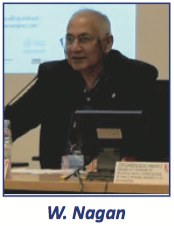
The current technological revolution poses enormous challenges to political and economic organization and decision-making. Economy and politics are inseparable. Both relate to forms of social power that are interconvertible and mutually interdependent. A valid science of society must necessarily encompass both objective and subjective dimensions, including the central importance of human values and human dignity, which are excluded from consideration by the prevailing philosophy of logical positivism. New paradigms of political and economic thinking are needed to account for the value implications of public policy. Paper published in Cadmus Journal Volume 2 Issue 6. |
|
Crises of Neoliberalism
Unregulated financial activity, a consequence of neoliberalism, is the root cause of financial crises. What the world needs today are productive investments that meet human needs and create employment. At the root of the current crisis are not subprime mortgages, credit rating agencies, financial institutions or central banks. It is the Great Divorce between finance and economy. |
Eco-system Services
Valuing Nature is essential for better economic and ecological planning and decision-making. The attempt to objectively quantify the value of Nature by quantifying the exchange value or by aggregating value categories is fundamentally flawed. The instrumental value of things does not properly reflect their inherent value. The scope for applying economic measurement to biodiversity and ecosystems is limited. It ignores the fact that humans have a responsibility for nature irrespective of its notational value to them. |
Towards a Living Society
Current economic theory, predominantly mechanistic in its nature, wrongly treats the economy as separate from society and nature. Global governance today is dysfunctional, so much so that we are not ready for the emergence of a new paradigm because our consciousness has not evolved with the evolving times. The transformation we envision requires changing the present conceptual framework and that requires stepping out of our social and mental blind spots. The transformation will not be smooth or linear. |
|
 
A radical new approach to human development to address the multiple challenges confronting humanity today.Towards a socially inclusive and environmentally healthy human communityThe growing gap between the rapid pace and current direction of unbridled technological development and the slower process of social and cultural evolution poses serious threats to human security and social stability. It also presents unprecedented opportunities for ushering in a more peaceful, prosperous and equitable world for all. Managing these challenges and opportunities was the central theme of the international conference ‘Technology + Society =? Future’ held in Podgorica, Montenegro on May 19–20, 2016, under the auspices of the Montenegrin Academy of Sciences and Arts, in cooperation with the World Academy of Art & Science, European Academy of Sciences and Arts, Global Round Table and All European Academies. MASA is a center of WAAS, and has hosted two international conferences in collaboration with WAAS in the past 4 years.
The conference explored both the opportunities and challenges posed by rapid technological advances and measures to restore control over our own destiny. Welcome addresses were delivered by Momir Ðurovic, President, Montenegrin Academy of Sciences and Arts; Heitor Gurgulino de Souza, President of WAAS; Felix Unger, President, European Academy of Sciences and Arts; Gordon McBean, President, International Council for Science; Mathieu Denis, Executive Director, International Social Science Council; Peter F. McGrath, Coordinator, The InterAcademy Partnership; Graham Caie, European Federation of Academies of Sciences and Humanities; Gilbert Fayl, President, The Global Round Table; and Marcelo Sorondo, Chancellor, Pontifical Academy of Sciences.
|
Co-evolution of Technology & SocietyAlexander Likhotal, Carlos Alvarez Pereira, Loucas Christophorou, and Ljupco Kocarev discussed the emerging co-evolution of technology and society. With scientific advance, we need greater ethical vision; better judgment; and stronger analysis of how to use knowledge for good and not ill. New universal education is critical, and not just for those who expect to practice science but for all. Scientists and society have an enormous responsibility towards the future, and this must be grounded on basic human values and the mutual accommodation of science and society via enhanced dialogue and trust. |
Science, Technology & EducationThe importance of basic research for technological advances, and governing the advances by education were core of the presentations of Eric Hoedl, Alberto Zucconi, Nebojša Nešković, and Ulric Fayl V. Hentaller. The technological revolution is blurring the lines between the physical, digital, and biological spheres and will affect all the bio-psycho-social dimensions. Science needs to be made more approachable and relevant to humanity. Effective and person- centered education will be an important variable of the new revolution in terms of fostering new processes and products. |
Climate, Energy & SustainabilityThe challenge of climate, energy and sustainability was the focus of Agni Vlavianos Arvanitis, Neven Duić, Rajendra Pachauri, and Noam Lior. A life-supporting paradigm needs to be placed at the core of technology, policy and education, and to form the basis of thinking and action for every citizen, in order to shape tomorrow’s sustainable world. |
Economy, Employment & TechnologyFinancial innovations, globalization, their impact on the future, and the historical relationship between technology, employment and human welfare and its impact on producers, consumers, capitalists and workers were the areas explored by Garry Jacobs, Saša Popović, and Lorenzo Gascon. A comprehensive human-capital intensive development social strategy is needed for higher education and skills development. |
Values, Culture & TechnologyJüri Engelbrecht, Winston Nagan, Zlatko Lagumdžija, and Saulo José Casali Bahia explored the role and relevance of values in the evolution of the technological capacity of the highly complex system that society is today. So dramatic have technological developments been that they challenge the traditional grounding of human identity, spiritual aspiration and transcendental consciousness. A new paradigm or partnership between people, planet and production is needed to give us new hope and enable us to make our ideas live. |
Ecology & Social JusticeUllica Segerstrale explored cooperation as a social technology. Tibor Tóth spoke on the topic of the global regimes of weapons and technologies of mass destruction. Paulo Alcantara Gomes and Miloš Trifković took up the cases of the countries Brazil and Bosnia & Herzegovina respectively. S. E. Mons. Marcelo Sánchez Sorondo, Chancellor, Pontifical Academy of Sciences, Vatican spoke about the integral ecology that encompasses ecological balance, social justice and spiritual responsibility. The concluding remarks for the conference were made by Ivo Šlaus. |

 Report of the WAAS General AssemblyMay 19, 2016, Podgorica, MontenegroThe General Assembly of the World Academy of Art & Science was held on May 19, 2016 in Podgorica, Montenegro. Heitor Gurgulino de Souza, the President, opened the Meeting and proposed its agenda. This was followed by a review of the Academy’s program framework, reports on its partnerships, finances, nominations, activities of the Board of Trustees and changes to the Bylaws, followed by a general discussion. 26 Fellows and Associate Fellows of the Academy were present. Program FrameworkThe current program framework of the Academy consists of projects on: new paradigm of human development, new economic theory, full employment, rule of law, new sciences, evolution of individuality, limits to rationality, abolition of nuclear weapons, and security and sustainability. There have been three meetings recently devoted to new economic theory, and five past and three future post-graduate certificate courses organized in the Inter-University Centre, Dubrovnik, Croatia. Partnerships and CentersThe Academy has collaborations with its partners and centers, namely the European Leadership Network (ELN), London, UK; the European Organization for Nuclear Research (CERN), Geneva, Switzerland; the Library of Alexandria, Egypt; the Nizami Ganjavi International Center, Baku, Azerbaijan; the Al-Farabi Kazakh National University, Almaty, Kazakhstan; the Montenegrin Academy of Sciences and Arts, Podgorica, Montenegro; and the International Centre for Sustainable Development of Energy, Water and Environment Systems (SDEWES), Zagreb, Croatia. Activities of the Board of TrusteesThe Academy has been involved in numerous activities in the recent years, and participated in numerous meetings. The Academy had operated an awards program during the 1970s. Connected to that, the Board recently considered establishment of a new award program and appointed an ad hoc committee to make recommendations on how to do that.
Finances and Fund-raisingThe Academy is a very lean organization. It is aided by the fact that its Officers and Trustees donate their time, travel at their own expense, and pay membership dues four-times that of basic dues. Grants from the Mother’s Service Society, Pondicherry, India, cover basic administrative expenses. The Academy’s centers and partners contribute by hosting conferences, such as the three events organized by the Montenegrin Academy of Sciences and Arts. In the past one year, the Academy has also been the recipient of a grant from Google for free web advertising, which is used to promote awareness of its events, publications and website. The involvement of the Academy’s members by way of donations and contacts with donors to support its projects related to new paradigm of human development, new economic theory and higher education would be particularly welcome.
NominationsThe current period of nominations of new Fellows will terminate on July 1, 2016, the Nominations and Evaluations Committee of the Academy will evaluate the candidates from July 4 to 31, 2016, the Board of Trustees will consider the candidates from August 8 to September 4, 2016, and the Plenum of the Academy will vote on the candidates from September 19 to October 30, 2016. Changes or Amendments of the BylawsThe Bylaws Committee of the Academy had been formed by the Board of Trustees with the task to prepare a proposal of changes or amendments of the Bylaws. In its recent Meeting, the Board accepted the proposed changes or amendments. They will be sent to the Plenum for approval in the next elections. Some of the comments that were made during the discussion are:
Based on the report by Nebojša Nešković Secretary General, WAAS  |
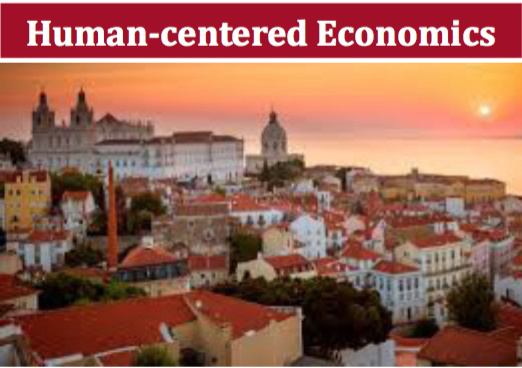
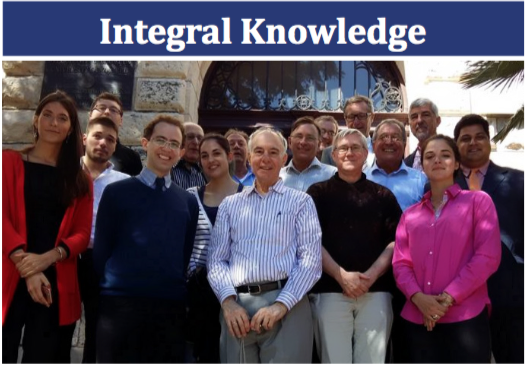
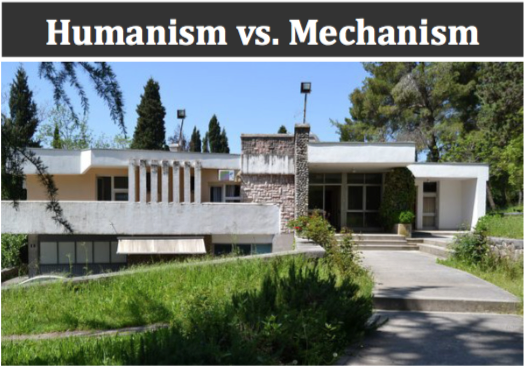
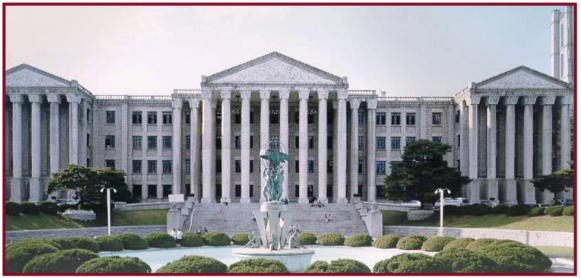
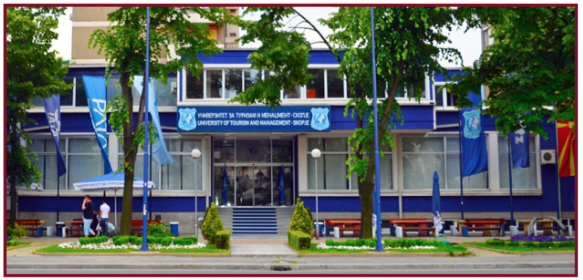
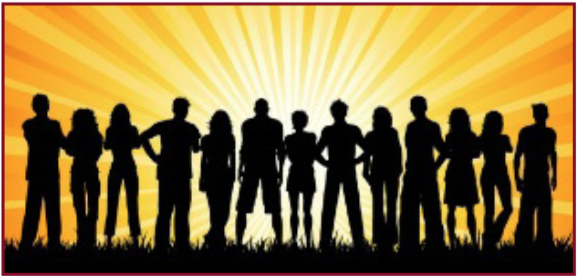
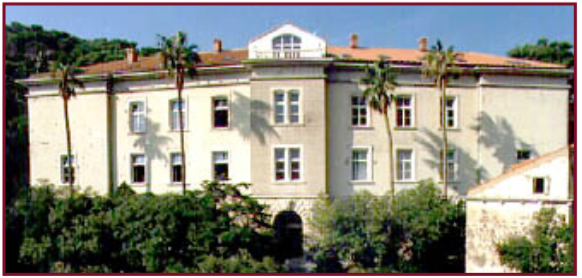



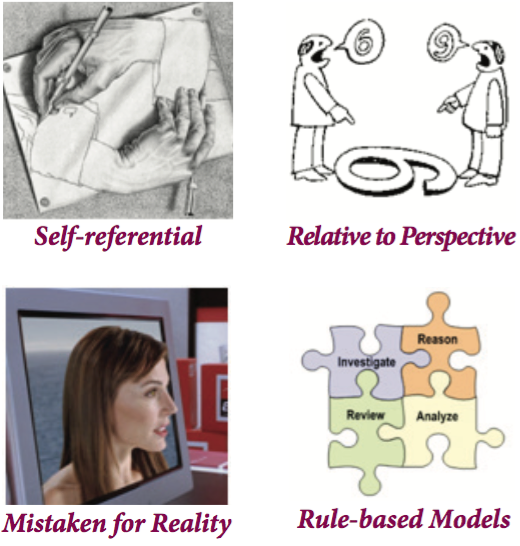
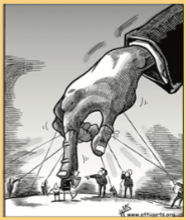
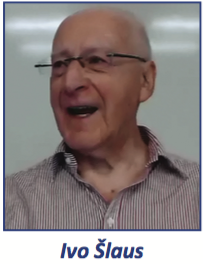
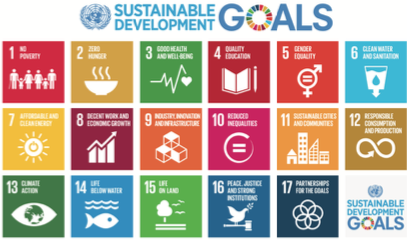

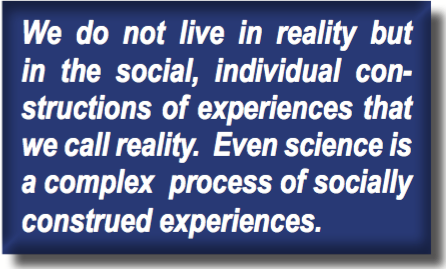
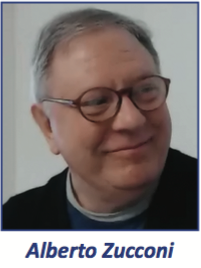 Karl Menninger famously said that people make self-fulfilling prophecies. We construct and determine our psychological, social, emotional, mental realities ALL the time.
Karl Menninger famously said that people make self-fulfilling prophecies. We construct and determine our psychological, social, emotional, mental realities ALL the time.
 Fragmented, compartmentalized knowledge is totally inadequate to reflect the intricate interconnectedness and complexity of our rapidly evolving human civilization.
Fragmented, compartmentalized knowledge is totally inadequate to reflect the intricate interconnectedness and complexity of our rapidly evolving human civilization.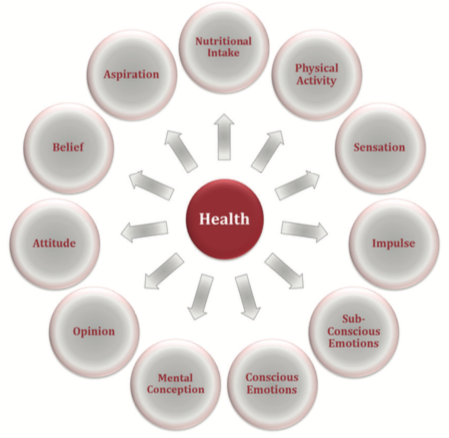
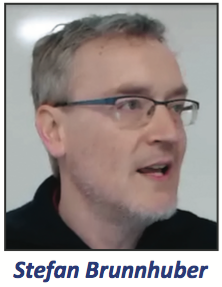
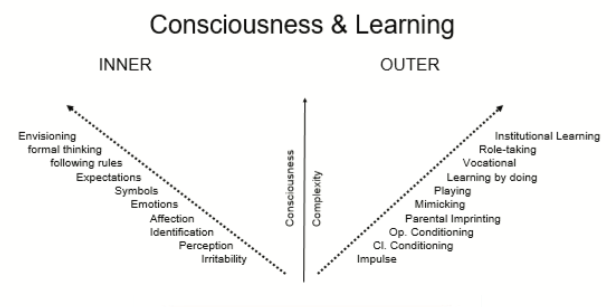 The mind is not the brain.
The mind is not the brain.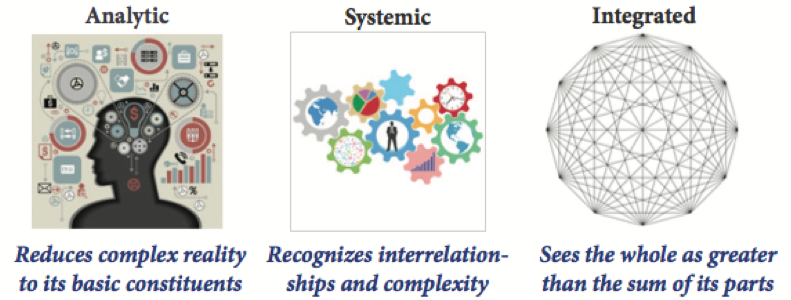
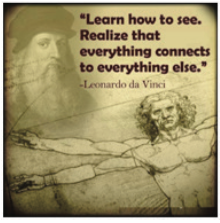
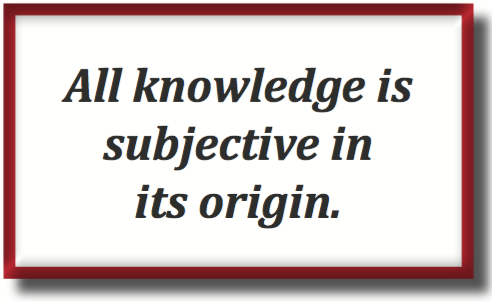
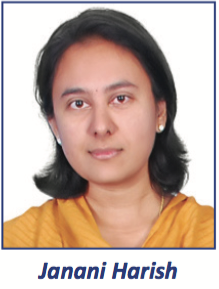 Analogy, metaphor and symbol capture the richness of life and complexity of reality that are missed by the linear, logical and literal language of science.
Analogy, metaphor and symbol capture the richness of life and complexity of reality that are missed by the linear, logical and literal language of science.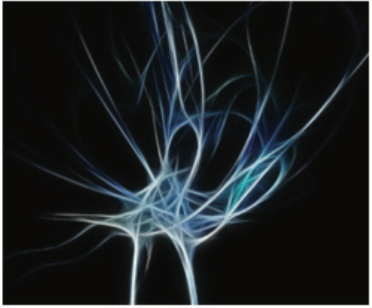
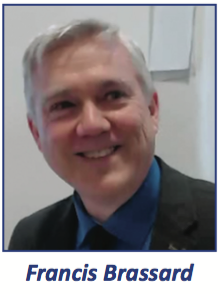 The individual and the society, the subject and the object do not exist independently of each other. In order to fully grasp reality, they must be viewed in an integrated way. This is exemplified by the extraordinary creativity of Ruđer Josip Bošković.
The individual and the society, the subject and the object do not exist independently of each other. In order to fully grasp reality, they must be viewed in an integrated way. This is exemplified by the extraordinary creativity of Ruđer Josip Bošković.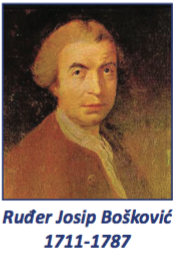
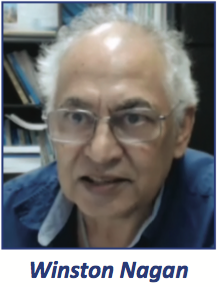
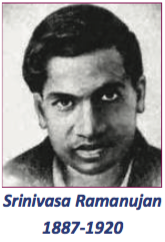 Mathematics is regarded as the most logical and methodological of all sciences. Therefore it is especially ironic that one of the greatest mathematicians of all time arrived at his discoveries without either of them.
Mathematics is regarded as the most logical and methodological of all sciences. Therefore it is especially ironic that one of the greatest mathematicians of all time arrived at his discoveries without either of them.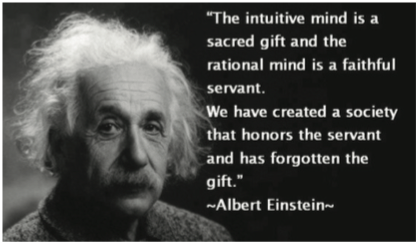 Great scientists confirm that their breakthrough discoveries were the result of non-linear, non-logical processes. Science education focuses only on methods for verification, rather than the creative thought processes that generate new discoveries.
Great scientists confirm that their breakthrough discoveries were the result of non-linear, non-logical processes. Science education focuses only on methods for verification, rather than the creative thought processes that generate new discoveries. Knowledge is an intellectual process. Knowing is an emotional/spiritual process. Knowledge comes from acquiring information.
Knowledge is an intellectual process. Knowing is an emotional/spiritual process. Knowledge comes from acquiring information.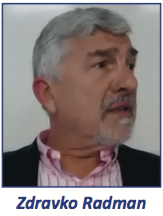
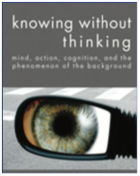 The mind is not the brain.
The mind is not the brain.
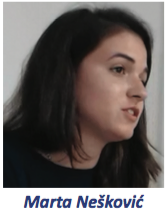
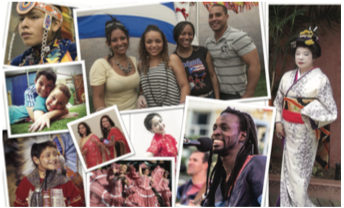 What mind observes as separate or even opposite things, are complementary aspects of a greater reality. Thus the individual and the collective are two complementary aspects of social reality.
What mind observes as separate or even opposite things, are complementary aspects of a greater reality. Thus the individual and the collective are two complementary aspects of social reality.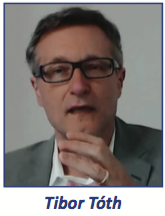

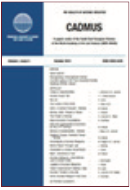
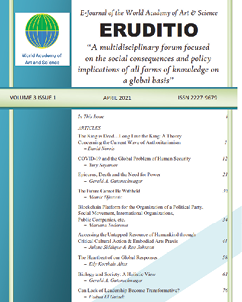
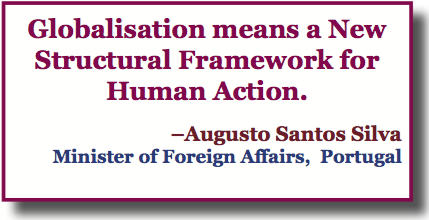


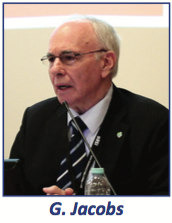 Society is a complex, conscious, integrated living organism undergoing a continuous process of evolution.
Society is a complex, conscious, integrated living organism undergoing a continuous process of evolution.
